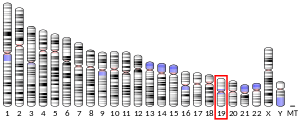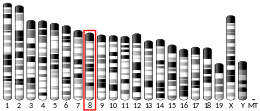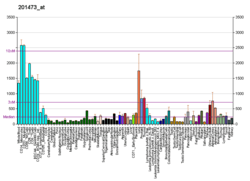JUNB
Transcription factor jun-B is a protein that in humans is encoded by the JUNB gene.[5][6] Transcription factor jun-B is a transcription factor involved in regulating gene activity following the primary growth factor response. It binds to the DNA sequence 5'-TGA[CG]TCA-3'.
See also
- AP-1 (transcription factor)
References
- GRCh38: Ensembl release 89: ENSG00000171223 - Ensembl, May 2017
- GRCm38: Ensembl release 89: ENSMUSG00000052837 - Ensembl, May 2017
- "Human PubMed Reference:". National Center for Biotechnology Information, U.S. National Library of Medicine.
- "Mouse PubMed Reference:". National Center for Biotechnology Information, U.S. National Library of Medicine.
- Schütte J, Viallet J, Nau M, Segal S, Fedorko J, Minna J (Feb 1990). "jun-B inhibits and c-fos stimulates the transforming and trans-activating activities of c-jun". Cell. 59 (6): 987–997. doi:10.1016/0092-8674(89)90755-1. PMID 2513129.
- "Entrez Gene: JUNB jun B proto-oncogene".
- Hu YF, Li R (Jun 2002). "JunB potentiates function of BRCA1 activation domain 1 (AD1) through a coiled-coil-mediated interaction". Genes Dev. 16 (12): 1509–17. doi:10.1101/gad.995502. PMC 186344. PMID 12080089.
- Liberati NT, Datto MB, Frederick JP, Shen X, Wong C, Rougier-Chapman EM, Wang XF (Apr 1999). "Smads bind directly to the Jun family of AP-1 transcription factors". Proc. Natl. Acad. Sci. U.S.A. 96 (9): 4844–9. doi:10.1073/pnas.96.9.4844. PMC 21779. PMID 10220381.
Further reading
- Hsu JC, Bravo R, Taub R (1992). "Interactions among LRF-1, JunB, c-Jun, and c-Fos define a regulatory program in the G1 phase of liver regeneration". Mol. Cell. Biol. 12 (10): 4654–65. doi:10.1128/MCB.12.10.4654. PMC 360392. PMID 1406655.
- Zafarullah M, Martel-Pelletier J, Cloutier JM, Gedamu L, Pelletier JP (1992). "Expression of c-fos, c-jun, jun-B, metallothionein and metalloproteinase genes in human chondrocyte". FEBS Lett. 306 (2–3): 169–172. doi:10.1016/0014-5793(92)80992-P. PMID 1633872.
- Mollinedo F, Vaquerizo MJ, Naranjo JR (1991). "Expression of c-jun, jun B and jun D proto-oncogenes in human peripheral-blood granulocytes". Biochem. J. 273(Pt 2) (2): 477–9. doi:10.1042/bj2730477. PMC 1149869. PMID 1899335.
- Nomura N, Ide M, Sasamoto S, Matsui M, Date T, Ishizaki R (1990). "Isolation of human cDNA clones of jun-related genes, jun-B and jun-D". Nucleic Acids Res. 18 (10): 3047–3048. doi:10.1093/nar/18.10.3047. PMC 330838. PMID 2112242.
- Maruyama K, Sugano S (1994). "Oligo-capping: a simple method to replace the cap structure of eukaryotic mRNAs with oligoribonucleotides". Gene. 138 (1–2): 171–174. doi:10.1016/0378-1119(94)90802-8. PMID 8125298.
- Trask B, Fertitta A, Christensen M, Youngblom J, Bergmann A, Copeland A, de Jong P, Mohrenweiser H, Olsen A, Carrano A (1993). "Fluorescence in situ hybridization mapping of human chromosome 19: cytogenetic band location of 540 cosmids and 70 genes or DNA markers". Genomics. 15 (1): 133–145. doi:10.1006/geno.1993.1021. PMID 8432525.
- Phinney DG, Tseng SW, Ryder K (1996). "Complex genetic organization of junB: multiple blocks of flanking evolutionarily conserved sequence at the murine and human junB loci". Genomics. 28 (2): 228–234. doi:10.1006/geno.1995.1135. PMID 8530030.
- Dorsey MJ, Tae HJ, Sollenberger KG, Mascarenhas NT, Johansen LM, Taparowsky EJ (1996). "B-ATF: a novel human bZIP protein that associates with members of the AP-1 transcription factor family". Oncogene. 11 (11): 2255–65. PMID 8570175.
- Neyns B, Vermeij J, Bourgain C, Vandamme B, Amfo K, Lissens W, DeSutter P, Hooghe-Peters E, DeGrève J (1996). "Expression of the jun family of genes in human ovarian cancer and normal ovarian surface epithelium". Oncogene. 12 (6): 1247–57. PMID 8649827.
- Mendelson KG, Contois LR, Tevosian SG, Davis RJ, Paulson KE (1996). "Independent regulation of JNK/p38 mitogen-activated protein kinases by metabolic oxidative stress in the liver". Proc. Natl. Acad. Sci. U.S.A. 93 (23): 12908–12913. doi:10.1073/pnas.93.23.12908. PMC 24019. PMID 8917518.
- Aronheim A, Zandi E, Hennemann H, Elledge SJ, Karin M (1997). "Isolation of an AP-1 repressor by a novel method for detecting protein-protein interactions". Mol. Cell. Biol. 17 (6): 3094–102. doi:10.1128/mcb.17.6.3094. PMC 232162. PMID 9154808.
- Suzuki Y, Yoshitomo-Nakagawa K, Maruyama K, Suyama A, Sugano S (1997). "Construction and characterization of a full length-enriched and a 5'-end-enriched cDNA library". Gene. 200 (1–2): 149–156. doi:10.1016/S0378-1119(97)00411-3. PMID 9373149.
- Fuchs SY, Xie B, Adler V, Fried VA, Davis RJ, Ronai Z (1998). "c-Jun NH2-terminal kinases target the ubiquitination of their associated transcription factors". J. Biol. Chem. 272 (51): 32163–32168. doi:10.1074/jbc.272.51.32163. PMID 9405416.
- Venugopal R, Jaiswal AK (1999). "Nrf2 and Nrf1 in association with Jun proteins regulate antioxidant response element-mediated expression and coordinated induction of genes encoding detoxifying enzymes". Oncogene. 17 (24): 3145–3156. doi:10.1038/sj.onc.1202237. PMID 9872330.
- Li B, Tournier C, Davis RJ, Flavell RA (1999). "Regulation of IL-4 expression by the transcription factor JunB during T helper cell differentiation". EMBO J. 18 (2): 420–432. doi:10.1093/emboj/18.2.420. PMC 1171136. PMID 9889198.
- Liberati NT, Datto MB, Frederick JP, Shen X, Wong C, Rougier-Chapman EM, Wang XF (1999). "Smads bind directly to the Jun family of AP-1 transcription factors". Proc. Natl. Acad. Sci. U.S.A. 96 (9): 4844–4849. doi:10.1073/pnas.96.9.4844. PMC 21779. PMID 10220381.
- Chen P, Flory E, Avots A, Jordan BW, Kirchhoff F, Ludwig S, Rapp UR (2000). "Transactivation of naturally occurring HIV-1 long terminal repeats by the JNK signaling pathway. The most frequent naturally occurring length polymorphism sequence introduces a novel binding site for AP-1 factors". J. Biol. Chem. 275 (27): 20382–20390. doi:10.1074/jbc.M001149200. PMID 10764760.
- Echlin DR, Tae HJ, Mitin N, Taparowsky EJ (2000). "B-ATF functions as a negative regulator of AP-1 mediated transcription and blocks cellular transformation by Ras and Fos". Oncogene. 19 (14): 1752–1763. doi:10.1038/sj.onc.1203491. PMID 10777209.
- Verrecchia F, Pessah M, Atfi A, Mauviel A (2000). "Tumor necrosis factor-alpha inhibits transforming growth factor-beta /Smad signaling in human dermal fibroblasts via AP-1 activation". J. Biol. Chem. 275 (39): 30226–30231. doi:10.1074/jbc.M005310200. PMID 10903323.
External links
- JUNB+protein,+human at the US National Library of Medicine Medical Subject Headings (MeSH)
This article incorporates text from the United States National Library of Medicine, which is in the public domain.
This article is issued from Wikipedia. The text is licensed under Creative Commons - Attribution - Sharealike. Additional terms may apply for the media files.




